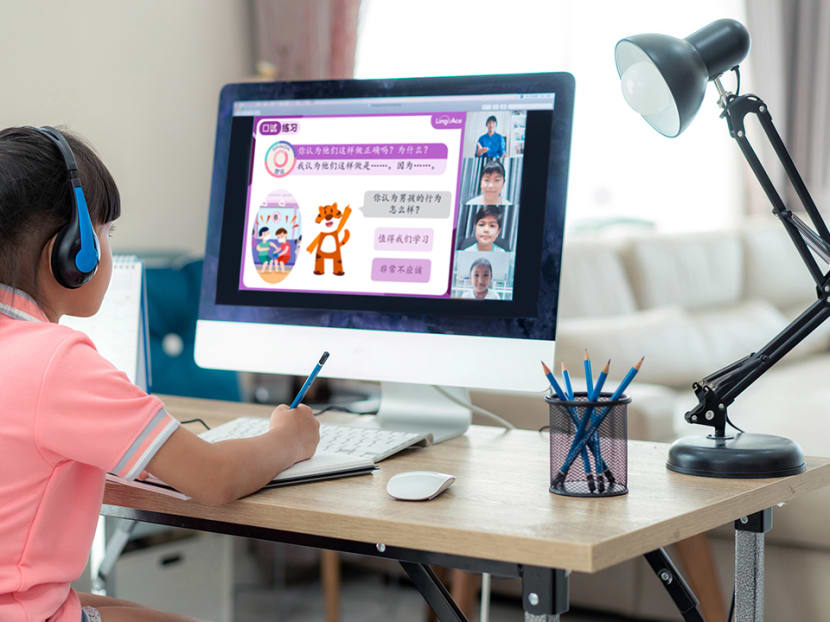Learning Chinese, made fun for little ones
How can you create a comfortable, immersive environment for young learners to pick up Mandarin? LingoAce’s learning experts share some helpful tips.

Children today are digital natives, so it makes sense to tap into their interest in digital entertainment to make lessons more engaging. Photos: LingoAce
LingoAce’s learning experts share tips on how to create a comfortable, immersive environment for young learners to pick up Mandarin
Last year, English overtook Mandarin as the most used language in Singaporean Chinese households – meaning that more children are growing up with less exposure to Mandarin in their earlier years.
This affects their ability to pick up Mandarin, as having access to native speakers offers children good language role models and encourages their interest in the language, culture and media – an interest that can act as a powerful driver of their enthusiasm for Mandarin later in life.
One method of stimulating children’s interest is to tap into their interest in digital entertainment. Children today are true digital natives – many are already familiar with swiping and tapping devices for entertainment and learning purposes. Correspondingly, edutech platforms like LingoAce are growing in popularity as more parents seek out digital learning experiences that combine technology and gamification with real-time teaching to help children learn comfortably and motivate them to progress further in their mastery of Chinese.
LingoAce’s regional general manager Goh Aik Chuan, academic director Peggy Lim and curriculum product manager Roi Xu share their insights into how LingoAce helps young children to learn, and tips on how to make learning Chinese fun and enjoyable.
AN EXCITING APPROACH TO MANDARIN FOR EARLY LEARNERS
Without enough exposure to Mandarin, children may face difficulties in understanding and communicating with their Chinese language teachers when they enter primary school – an experience that puts them off the subject.
Said Ms Lim: “Being unable to understand Mandarin may cause children to have a fear of the language. Hence, it would be good if children have an immersive environment to use Chinese in, to become comfortable with the language when they enter primary school.”
LingoAce creates that immersive environment through digital means, allowing children to learn at their own pace, without traditional classroom pressure. Mr Goh explained that the platform’s pre-school foundation programme takes a scenario-based approach to its curriculum, with each lesson being “just like a different episode from a cartoon TV show”.
“We created 96 animated stories with our own original characters, Tigo and Duoduo,” he said. “The children have a chance to immerse themselves into the storyline, getting to know new friends with Tigo and learning new words with Duoduo. This, along with online interactive games, increases the level of enjoyment and drives high levels of learning motivation.”
Students – who are grouped in small classes of not more than four – are guided through their digital lessons in real time by teachers who hail from top-ranked language universities from around the world. They are native speakers who hold international CTCSOL accreditation – an official certification recognising their specialised ability to teach Chinese to non-native speakers.
Mr Xu said that the platform’s teachers engage their students with an energetic, lively teaching style and specially designed course materials that make use of bright colours to provide visual stimulation for developing minds.
“We use songs, we dance and we role-play to fully utilise the total physical response of our learners,” he said.
CREATING A CONDUCIVE LEARNING ENVIRONMENT, ONLINE AND OFF

To help young children focus better during their online learning experience, Mr Roi suggested designating a room or a dedicated space with good lighting for studying, instead of using the child’s bedroom or busy common areas such as the living and dining rooms.
He also advocates for children to be independent learners. “While parents are welcome to monitor the class, we discourage parents from helping kids to answer questions. When the child gets used to online learning, the parent’s presence during lessons should be reduced.”
Parents can use LingoAce’s personalised report in order to keep up with their child’s progress. “We give feedback on the child’s strengths and key areas to work on, as well as what they like and dislike about the Chinese language,” said Mr Xu.
Outside of lessons, Ms Lim said that parents can make learning Chinese more fun by assigning children tasks that involve using the language, such as ordering food in Mandarin when the family dines out.
“Parents can bond with their children by watching Chinese cartoons or movies together,” she said. “Games are also a good idea to inject fun into learning. Try putting a Chinese spin on games that your children are already familiar with, such as Taboo or Pictionary. Games that focus on language are an encouraging way to assess your children’s understanding of Chinese words and to help improve fluency, compared to traditional focus on tests.”
Her final recommendation is for parents to set aside a day in the week to communicate with their children in Mandarin, and to make acquiring the language a family affair.
“It doesn’t matter if parents are not fluent in the language,” she said. “Take it as an opportunity to learn alongside your children. Your children will be more willing to use and learn Chinese when they see that you are also learning with them.”
Interested in giving your child a headstart in Mandarin? Sign up for a free trial class at lingoace.com.








